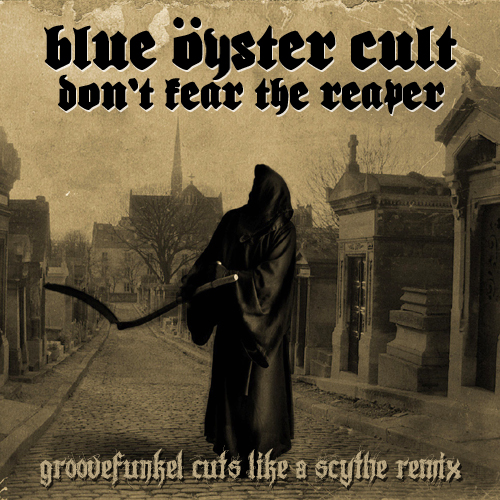

In 1997 Mojo listed the song as the 80th best single of all time, while Q ranked "(Don't Fear) The Reaper" number 404 in its 2003 countdown of the "1001 Best Songs Ever." In 1976 Rolling Stone named "(Don't Fear) The Reaper" the song of the year and, in 2004, the magazine placed the song at number 397 on its list of "The 500 Greatest Songs of All Time" however, the 2010 version of the list moved it down to number 405. Sales+streaming figures based on certification alone.

It really pulled the track together." However, producer David Lucas says that he played it, a claim supported by bandmember Eric Bloom. But he put all this tape around a cowbell and played it. Bassist Joe Bouchard remembered the producer requesting his brother, drummer Albert Bouchard, play the cowbell: "Albert thought he was crazy. The song features prominent use of the cowbell percussion instrument, overdubbed on the original recording.

What evolved in the studio was the extended solo section it took them nearly as long to edit the five-minute track down to manageable length as it did to record it." ‘The legendary once-in-a-lifetime groove!’. Mojo described its creation: "'Guys, this is it!’ engineer Shelly Yakus announced at the end of the first take. Sound engineer Shelly Yakus remembers piecing together the separate vocals, guitar and rhythm section into a master track, with the overdubbing occurring in that order. The guitar solo and guitar rhythm sections were recorded in one take, while a four-track tape machine amplified them on the recording. The riff was recorded with Krugman's Gibson ES-175 guitar, which was run through a Music Man 410 combo amplifier, and Dharma's vocals were captured with a Telefunken U47 tube microphone. The song's distinctive guitar riff is built on the "i-VII-VI" chord progression, in an A minor scale. "(Don't Fear) The Reaper" was written and sung by lead guitarist Buck Dharma and produced by David Lucas, Murray Krugman, and Sandy Pearlman. He guessed that "40,000 men and women" died each day, and the figure was used several times in the lyrics this rate was 100,000 off the mark. He used Romeo and Juliet to describe a couple who wanted to be together in the afterlife. Lyrics such as "Romeo and Juliet are together in eternity" have led many listeners to interpret the song to be about a murder-suicide pact, but Dharma says the song is about eternal love, rather than suicide. The song is about the inevitability of death and the foolishness of fearing it, and was written when Dharma was thinking about what would happen if he died at a young age.


 0 kommentar(er)
0 kommentar(er)
